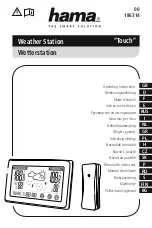
9
9
NOTE:
1. Avoid pressing any buttons on the main unit before the remote
temperature is displayed.
2. The effective operating range may be influenced by the surrounding
building materials and how the receiver and transmitter are positioned.
3. Place the remote sensor so that it faces the main unit (receiver),
minimizing obstructions such as doors, walls, and furniture.
4. Though the remote sensors are weather-resistant, they should be
placed away from direct sunlight, rain or snow. The best suggested
location for the remote sensor for outdoors is under the eave on the north
side of the building.
NOTE: When the temperature falls below freezing, the batteries in
the outdoor remote sensor may have reduced volt age supply and a
shorter effective range. We recommend using lithium batteries at
temperatures of 32°F (0°C) and below.
BATTERY INSTALLATION
REMOTE SENSOR
NOTE: Install the batteries; select the channel and temperature in C°
or F° before mounting the remote sensor.
·
Remove the screws from the battery compartment with a small
Phillips screwdriver.
·
Set the channel. The switch is located in the battery
compartment. Channel 1 is typically selected if only one remote
sensor is being used.
·
Install 2 “AA” size alkaline batteries (not included) matching the
polarities shown in the battery compartment.
·
Replace the battery compartment door and secure the screws.
·
Secure the remote sensor in the desired location.
10
MAIN UNIT
·
Open the battery compartment door.
·
Install 4 batteries (UM-3 or “AA” size 1.5V) matching the polarity
as shown in the battery compartment.
·
Replace the battery compartment door.
LOW BATTERY WARNING
A low-battery indicator [
] will appear on the indoor or remote
temperature reading line of the main unit warning that the corresponding
batteries need replacement.
GETTING STARTED
After batteries are installed; remote sensor will transmit temperature
readings at 45 second intervals. It may take up to two minutes to receive
the initial readings. Upon successful reception, remote temperature will
appear in the temperature window below the weather forecast on the
main unit’s display (the default remote channel is channel one). The main
unit will automatically update readings.
After communication between the main unit and remote sensor has
been established, secure the remote sensor in the desired location.
If no signal is received from the remote sensor within two minutes,
dashes [- - -] will be displayed. Press and hold the main unit DOWN (▼)
button for two seconds to initiate another signal search for the remote.































